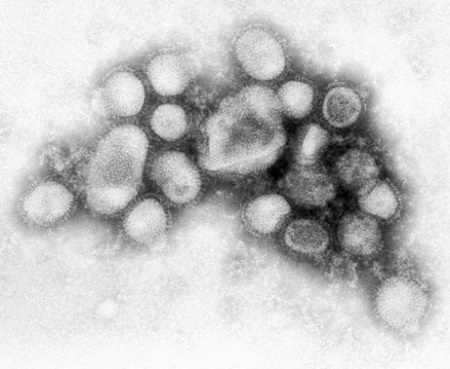|
|
Author's Note: My twin sister Jhilya, a microbiologist working in medical communications, writes today about some recent developments in the H1N1 pandemic. Still several weeks ahead of the expected seasonal flu peak, the Human-Avian-Swine H1N1 flu has already claimed 1,000 American lives and nearly 5,000 worldwide. Below, an update on recent developments and how to protect yourself.
This past weekend, President Obama declared the H1N1 flu outbreak to be a national emergency. But what exactly does that mean?
Declaring this particular flu situation as a national emergency means that the Department of Health and Human Services can use alternate strategies for identifying and treating patients who may need care (for example setting up alternate treatment sites and adjusting triage protocols to meet the needs of a community). It's somewhat similar to when an emergency is declared after a hurricane, tornado or other natural disaster.
Of serious concern is the fact that H1N1 flu seems to be causing serious problems in young adults, a group that's usually not at high risk of complications from the 'regular' seasonal flu. In 2009, approximately 90% of the hospitalizations and deaths from the H1N1 flu were in patients under the age of 65. With the typical seasonal flu, the opposite is usually the case with 60% of hospitalizations and 90% of deaths occurring in people over 65. Every year, over 30,000 Americans die of flu-related complications, so it's important to remember that even seasonal flu can be deadly. But the fact that this year's H1N1 is hitting younger people harder is of concern for doctors and scientists alike.
Structure of the H1N1 flu virus. From the Centers for Disease Control and Prevention.

The good news is that, just months after the initial outbreak, there is now a vaccine to protect you from H1N1. But as with many vaccines, there's been some controversy around it. Because this strain of H1N1 is so new, many people are skeptical that the vaccine against it has been tested properly and that enough safety data has been collected. (Note that the H1N1 vaccine was developed through a reliable and extensively tested protocol used to generate seasonal flu vaccine each year) There is also a problem of availability; while pretty much everyone who wants a seasonal flu shot can get one - at a doctor's office, local drugstore, or even a school or office building - many providers across the country are sticking to the recommended guidelines for H1N1 recipients. This strategy will help ensure that as mostly higher-risk individuals are receiving the 22 million doses currently available in the U.S., as vaccine makers work to produce enough for everyone.
Why vaccinate? Well, the point of vaccinations is two-fold. One, of course, is to prevent you from getting sick from the flu. But there are larger implications as well. From a public health standpoint, vaccinations help to isolate and eradicate pathogens. In general, eradication is most successful when most or all individuals in a population are vaccinated; a classic example is polio, which, has been essentially eradicated in the US due to a vaccination program that started in 1955. Today, most of us probably don't know anyone who has polio, and this vaccination program is the reason.
The question everyone is asking now is, "Should I be vaccinated against H1N1?" Americans seem to be split down the middle with almost half saying they will get the vaccine, and the same number saying they won't. It's best to talk to your health care provider to decide what's best for you. It's important to know that the seasonal flu vaccine won't protect you from H1N1, nor will the H1N1 vaccine protect you from seasonal flu. So, in theory, if you don't get either vaccine, you could get the flu twice this year! That's why I chose to get the seasonal flu vaccine this year for the third year in a row. Still undecided about getting the H1N1, but for now, I'll take my chances.
-Jhilya Mayas, Ph.D.
Author's Note: Sources:
http://www.whitehouse.gov/blog/2009/10/25/president-obama-signs-emergency-declaration-h1n1-flu
http://www.fema.gov/
http://www.flu.gov/news/blogs/youngpeople.html
http://www.cdc.gov/H1N1flu/HAN/101909.htm
http://www.washingtonpost.com/wp-dyn/content/discussion/2009/10/27/DI2009102701054.html
http://www.cdc.gov/h1n1flu/vaccination/acip.htm
http://www.cdc.gov/vaccines/vac-gen/why.htm
http://www.cdc.gov/vaccines/vpd-vac/polio/dis-faqs.htm
Editor's Note: For more blogs from Dr. Rabiah, visit Science Chicago's website at: http://www.sciencechicagoblog.com
|